05/21/2025
From Heartbreak and Horror to Healing: A Community Farewell in Kibbutz Nir David
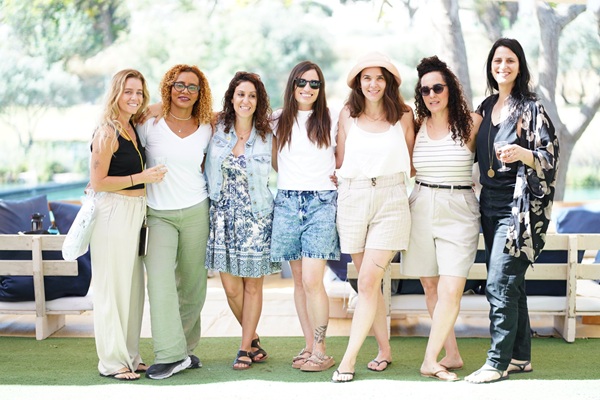
Friends reconnect
By the banks of the Asi Stream in northern Israel last Friday, a very special and one-of-a kind event took place in the warm spring sunlight. If you didn’t know better, you might have thought that this was a joyous school reunion or even a friendly block party. Men greeted one another with hearty backslaps and long embraces. Women clutched one another, kissed cheeks, and knelt to hug each other’s children. There were tears, yes, but more than that, there was laughter. But this was no ordinary get-together.
This was the final event of the temporary evacuee community at Kibbutz Nir David, a farewell to a makeshift home forged in crisis—and the unlikely village-within-a-village that formed there. Almost all of the families have moved on already from Nir David, either back to their homes or to other locations around the country, but this final get-together gave community members a chance to recharge, reconnect, and express their gratitude for the help they received.
From catastrophe to community
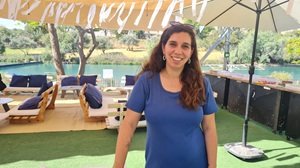
Michal Glikman-Angel
In the wake of the October 7, 2023 Hamas massacre and the ensuing Swords of Iron War, tens of thousands of families were forced to flee their homes along Israel’s southern and northern borders. Some had seen and suffered unspeakable violence. Others were simply too close to the front lines to remain. Many displaced Israelis ended up in hotels, guesthouses, and rural communities around the country. About 400 evacuees passed through Nir David—families from such places as Sderot, Yad Mordechai, and Gvar’am in the south, as well as Hanita, Dan, Kiryat Shmona, and other northern towns under fire from Hezbollah.
For months, the kibbutz housed a rotating population of displaced people—fragmented, exhausted, and unsure where to turn next. “It was really a mess in the first few months,” said Michal Glikman-Angel, an evacuee herself from Kibbutz Hagoshrim. “There was no real community. People came and went. It was hard to feel grounded.”
That changed thanks to the support of a number of organizations, including the Cleveland Jewish Federation. Among other things, the Federation funded Michal to serve as full-time community coordinator. Michal was able to organize emotional support services, group circles, enrichment classes, and countless activities for children and adults alike. More than that, she helped shape an environment that nurtured resilience—and built something resembling a home.
“Our partnership with the Cleveland Jewish community has been so meaningful,” Michal said. “We received so much support from them throughout the past year and a half. From one-on-one counseling sessions, to sports activities for kids, to team-building evenings—they helped us with all of it. Because of the Federation, we never felt alone. They even helped fund this final community event.”
Supporting men, women, and families
Tal Gefen, a social worker in the Valley of Springs Regional Council, joined the effort in April 2024 when she was named the social worker for all displaced persons in the region. She quickly became a central pillar of the Nir David community's healing. “The most significant support came through the groups set up for women and men,” she explained. “At first, the men’s circle faltered; they guys were hesitant about participating. But eventually, they came, they started talking and really opened up. In the end, they even asked for more.”
Around 30 to 40 people also received individual emotional support. But it was the group sessions that helped large numbers of the evacuees make sense of their shared trauma, reflect on their experiences, and rebuild a sense of purpose. “We had outings, workshops, and classes, and even helped evacuees outside Nir David across the entire regional council,” Tal said. “That was all thanks to the Federation.”
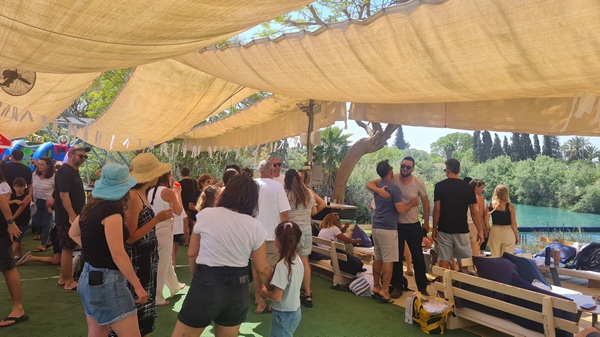
Gathering on the banks of the Asi Stream
The impact on individuals and families was personal and profound. Relli Shaked, a mother of two from Kiryat Shmona whose husband spent long stretches in army reserve duty, said the support “saved our family.”
“I hate to think what state we’d be in without it,” she said. “It allowed us to reground ourselves and reconstruct our personal resilience. That support helped people move on and return home faster—and healthier.”
Avia Azulai, who arrived in Nir David with her children just after the October attacks, admitted she didn’t even realize she needed help. “At first, I felt the activities were just filling time,” she said. “We were barely functioning. But I felt cared for and connected. That made all the difference.”
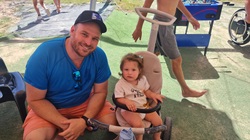
Yoni and Aviv Fertig
Others found unexpected community—and even joy—in the connections forged through hardship. Yoni Fertig, whose infant son Aviv was one of two evacuee children born during their time in Nir David, said the experience was like “making lemonade when life gave us lemons.” The support groups, he said, helped transform strangers into a surrogate family. “The Federation’s support really helped us get through this tough time. And we made friendships that may never have been formed otherwise.”
For Elah Cohen-Twitto, a reservist mother of three from Kibbutz Hagoshrim, the assistance was nothing short of a lifeline. “We've had so many meetings filled with sobbing and release—but also laughter and light,” she said through tears. “I don’t have enough words to thank the Cleveland community. They’ve been our light at the end of a very long and dark tunnel.”
Celebrating life, remembering those who have gone
The final event for the evacuee community offered an opportunity to both celebrate and reflect. Following the reunion-like gathering by the stream, families joined in a communal Koolulam-style singalong experience at the Nir David Cultural Center, then toured a photo exhibit capturing the early days of their evacuation.
The ceremony that followed was deeply emotional. Michal and other community leaders offered heartfelt thanks to the kibbutz, the regional council, the Federation, and other individuals and organizations who provided support. But perhaps the most poignant moment came during a minute of silence for the four evacuees who died while they and their families were at Nir David.
That moment was particularly heart-breaking for Hadas Weinstein from Metulla, whose husband Omer z’l was killed in late October 2024 in a Hezbollah attack on their farm near the Lebanese border. Omer had spent most weeks since the beginning of the war at their Metulla farm, coming back to Nir David just on weekends.
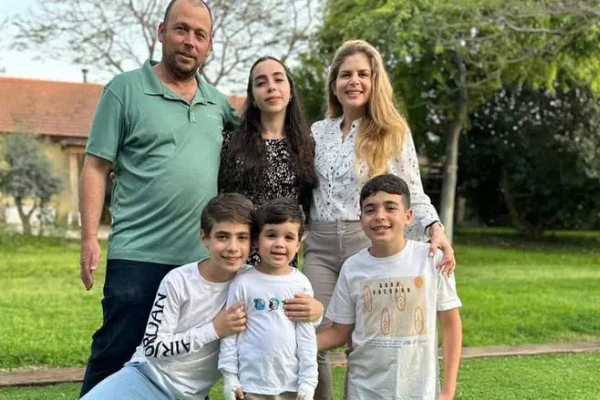
Omer z"l and Hadas Weinstein with their kids
“Until Omer was killed, I felt like we were growing, coming back to ourselves,” Hadas shared. “Afterward, everything changed. Suddenly, my kids and I needed emotional support just to get through the day.”
Her children were deeply affected by her husband’s death. They’ve received movement therapy and emotional care thanks to the Cleveland community’s support. “It saved us,” she said. “But we’re not out of the woods yet. I still don’t know where we’ll live after July. But this community gave us something we couldn’t find anywhere else—a sense of belonging.”
Moving on to the next chapter
As the last of the evacuee families prepare to close this chapter, they do so carrying more than just memories. They carry the imprint of healing, the strength of connection—and the enduring support of a community thousands of miles away.
“The Cleveland Federation has been our rock from day one,” Michal summarized. “They’re not just front and center, but behind the scenes too, with open hearts and helping hands. That’s a gift that just can’t be replaced."

